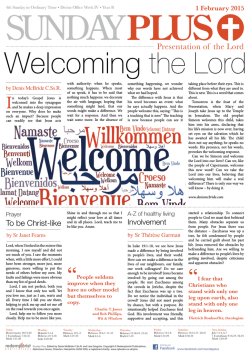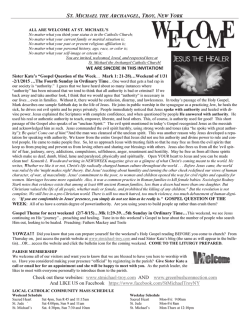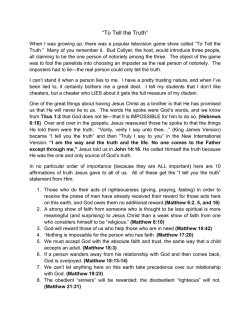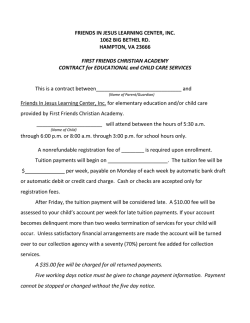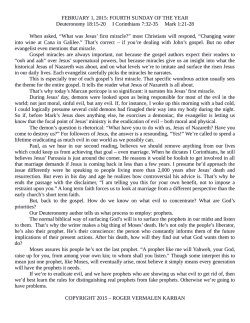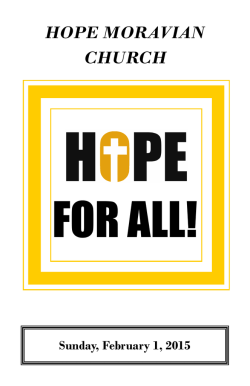
February 2015 - St. Mary Student Parish
Now from Liguori Publications! Fourth Sunday in Ordinary TimeFebruary 1, 2015 Challenging Teachings By Janel Esker A nyone who has served as a substitute teacher or babysitter or interim manager or even guest preacher knows the challenge of stepping into a role of authority over people who aren’t familiar with you. It’s possible they will hear your message or lesson plan with anticipatory ears, awakened from their usual routine. More likely, though, will be complaints: “Our teacher doesn’t do it that way,” or “that’s not how Mom makes our grilled-cheese sandwiches,” or Sunday Readings Deuteronomy 18:15–20 Moses declares that God will give the people a prophet “from among their kin” but includes the warning that failure to heed this prophet will result in death. 1 Corinthians 7:32–35 Paul encourages the Church to be free of everyday worries and distractions— even right responsibilities of family—that tempt them away from their ultimate call to discipleship. Mark 1:21–28 A man possessed with an unclean spirit confronts Jesus in the synagogue. Jesus exorcises the spirit, and his power attracts the attention of many in Galilee. “Our pastor doesn’t preach that long!” Jesus had a similar experience in the synagogue in Capernaum. It was customary for men in the community to take a turn teaching in the synagogue. However, Jesus’ teaching was like none the people had heard before—he spoke as one with authority. You can imagine the murmurings that traveled among the hearers, “Our scribes don’t teach that way.” “That’s not what we’re used to hearing!” One unclean spirit even confronted Jesus. Certainly this wouldn’t be the last time Jesus’ teachings led him into controversy. His continual challenge of the status quo eventually provoked those in power to send him to the cross. But the Gospel reports that the people in Capernaum were “amazed” at his new teaching. Most responded with awe and respect for his profound words. We who have been Christians for a while may think we know this Jesus and his teachings. We may have decided what his message is, and we may have constructed for ourselves a simple Christianity that just requires us to be “nice” to others. But are we willing to hear Jesus with new ears? His teachings are challenging, and they ought to shake us to the core. Will we, too, be amazed? † Liguori Publications l Liguori.org • When have I felt alone, afraid, anxious, distracted, or possessed? • How can I better listen to and follow the true teachings of Christ? Lord, your life and ministry is a model for humanity. Help me imitate your humility and be a servant to all people. —From Faithful Meditations for Every Day in Ordinary Time, Rev. Warren J. Savage and Mary Ann McSweeny The Practice of Catholic Social Teaching Challenging First Impressions By Fr. Rick Potts, CSsR T By James and Kathleen McGinnis C atholic social teaching is defined by seven principles: care for God’s creation; the life and dignity of the human person; the rights and responsibilities of the human person; the dignity of work and rights of workers; the solidarity of the human family; the option for the poor and vulnerable; and the call to family, community, and participation. Simply put, Catholic social teaching helps us understand and put into practice the two great commandments Jesus proclaimed: love God totally and love our neighbor as ourselves. This love expresses itself in two forms of action: the works of mercy (direct service, such as donating to food pantries) and the works of justice (social change, such as legislation to expand the food-stamp program). Catholic social teaching is nothing more or less than bringing the Gospel message to the social issues of our time. Through daily prayer and personal encounters, we develop relationships that motivate us to loving and sacrificial action. Moreover, when these relationships become mutually enriching experiences, then justice is being done. Catholic social teaching makes it clear that we have a duty to use our resources in ways that respect the rights of others. We must learn about the policies and practices of those businesses and services that we support and encourage others WEEKDAY READINGS February 1–7 to get involved. People can invite their families, friends, and colleagues to cosign letters to political leaders, heads of corporations, and school officials to change unjust policies and/or institute constructive ones, and to participate in boycotts. It is precisely such action that is making a difference in how we are caring for God’s creation. Whatever the specific principle, Catholic social teaching invites us to respond with our hands and hearts, not just our heads. As it says in the Letter of James, “Faith of itself, if it does not have works, is dead” (2:17). In the face of any fears that may keep us from action, we have Paul’s reminder in 2 Timothy that we have not been given “a spirit of cowardice but rather of power and love” (1:7). Let us pray that this spirit will prevail in our souls, be manifested in our deeds, and transform our nation and world. † Mon. The Presentation of the Lord: Malachi 3:1–4 / Hebrews 2:14–18 / Luke 2:22–40 Tue. St. Blaise; St. Ansgar: Hebrews 12:1–4 / Mark 5:21–43 Wed. Hebrews 12:4–7, 11–15 / Mark 6:1–6 o one degree or another, we group and grade, catalog and categorize. It is human nature to prejudge people according to a whole host of traits and characteristics. We are, after all, social beings, seeing groups before we see individuals. Consider for a moment all the groups and categories into which you fit. However natural this tendency may be, quite often our assumptions are in error and our first impressions are just wrong. The less a group or person is like us, the greater the likelihood we will judge them wrongly. We tend to allow our own prejudices to slip into the equation, judging “outsiders” more harshly than those who seem to be just like us. Making assumptions creates an even greater challenge. When I visited the Holy Land a few years ago, I knew it would challenge prejudices and stereotypes. What I learned is that prejudices only serve to encourage the continuing violence in the region rather than help with the important task of building peace. The photos I took, the faces of the Holy Land, showed people at work, at play, and at prayer. They were Jewish, Muslim, and Christian—but I couldn’t tell the difference. † Thu. St. Agatha: Hebrews 12:18–19, 21–24 / Mark 6:7–13 Fri. St. Paul Miki and Companions: Hebrews 13:1–8 / Mark 6:14–29 Sat. Hebrews 13:15–17, 20–21 / Mark 6:30–34 Copyright © 2015 Liguori Publications, One Liguori Drive, Liguori, MO 63057. 1-800-325-9521. Liguori.org. • Editor: Julia A. DiSalvo. Designer: Mark Bernard. • Scripture quotations in this publication are from New American Bible, revised edition, © 2010, 1991, 1986, 1970 Confraternity of Christian Doctrine, Washington, DC. • For licensing information, call 1-800-488-0488. • All rights reserved. Distribution rights granted only to license holders. BHW001 February 1, 2015 Now from Liguori Publications! Fifth Sunday in Ordinary Time February 8, 2015 Suffering and Healing By Janel Esker J ob speaks for all of us—OK, well, most of us. Certainly anyone who’s struggled with insomnia resonates with Job’s being “filled with restlessness until the dawn.” But most of us share with Job the experience of suffering. Some people have suffered beyond comprehension; others have known only “regular” suffering—illness, death, disability, tragedy—although it’s never regular when it happens to us. We’ve all felt the frightening despair of which Job speaks. Sunday Readings Job 7:1–4, 6–7 Job laments the “drudgery of life”: hard, hot working days; long, restless nights; and an endless, hopeless, restlessness. 1 Corinthians 9:16–19, 22–23 Paul describes his preaching as “an obligation” and “a stewardship.” So that others may gain the gift of salvation, he humbles himself and offers the gospel to all. Mark 1:29–39 Jesus cures many sick people, including Simon’s mother-in-law. Pressed by the disciples and crowds, he extends his preaching and healing to the nearby villages. Some fortunate souls haven’t experienced such challenges. During a talk I gave several years ago, I asked the audience to recall their own suffering. An older couple admitted they hadn’t experienced significant suffering. Their children were healthy, their parents died at a ripe old age, and life had been fairly easy for them. This isn’t the experience of most of us, however. Even if we’ve moved past such moments of pain and suffering, we can recall feeling as Job did—that life was misery, that hope was difficult to find. There certainly are no easy solutions to the problem of suffering. But in the Gospel today we see Jesus in his healing ministry, reaching out to many in need. Aren’t we, in our times of suffering, among the crowds gathered at Jesus’ door, begging for healing and mercy? Jesus is persistent in his healing—he doesn’t let exhaustion or weariness stop him. He reaches out, grasps hands, and is present to those who are hurting. Jesus is this persistent presence of healing to us, too. He sees us in the crowd, he grasps our hand, and he promises to stay with us always. † Liguori Publications l Liguori.org • When do I feel weary, weak, restless, ill, or enslaved? • How do my obligations—including my stewardship—heal, teach, and bring salvation to others? Lord, your touch is gentle and loving. Heal me of all that prevents me from seeing my sisters and brothers with eyes of love. —From Faithful Meditations for Every Day in Ordinary Time, Rev. Warren J. Savage and Mary Ann McSweeny Catholic Calendar: St. Josephine Bakhita By Mary Lee Barron, PhD, RN J osephine Bakhita was born in the Darfur region of Sudan in 1869. At nine, she was kidnapped from her home. This trauma caused her to forget her family surname. Her kidnappers gave her the name Bakhita, meaning “fortunate.” Josephine was sold often and endured horrific brutality. In 1883, was staying with the Canossian Sisters of the Institute of the Catechumens in Venice. It was there in 1890 that Bakhita heard the call to the faith and was baptized and confirmed, taking the name Josephine. She refused to return to her owner, and in a court case the judge concluded that since slavery was illegal in Italy, Josephine had been free since 1885. When she came of age, she declared her desire to become one of the sisters. Josephine spent the rest of her life at a house in northern Italy, where she was known for her gentleness, ready smile, and modesty, keeping the faith during day-to-day work and routines. She started writing her memoirs in 1910. They were published in 1930. Appearances throughout Italy made her famous and helped recruit missionary nuns for Africa, whom she also helped train. Her last years were marked with pain and illness, and she lost the ability to walk. She died in 1947 on February 8—her feast day—and was canonized in 2000. She is venerated as a modern African saint and as a saint with a special relevance to slavery and oppression. She is the patron saint of Sudan. † WEEKDAY READINGS February 8–14 Bioethics: Chronic Pain Management By Fr. Mark Miller, CSsR eople with chronic pain often are given medication that does not work or has awful side effects. They go from doctor to doctor seeking relief and end up with a reputation as complainers. The frustration level is high—for the chronic sufferer and for the doctor. I often hear stories from people who suffer horrible, constant pain even in the hospital. On requesting relief they are told, “Doctor’s orders: No medication for two more hours” or, “It’s not that bad” or even, “There is nothing we can do.” Ironically, much of the medical system simply minimizes the reality of pain. Denial reinforces the conviction that nothing needs to change. But a growing number of health-care providers, finally realizing the problems of chronic pain, specialize in pain treatment. P Mon. Genesis 1:1–19 / Mark 6:53–56 Tue. St. Scholastica: Genesis 1:20—2:4 / Mark 7:1–13 Wed. Our Lady of Lourdes: Genesis 2:4–9, 15–17 / Mark 7:14–23 Perhaps the key breakthrough for these doctors is their willingness to accept as true the testimony of pain sufferers. Because it is difficult to measure pain objectively, a doctor’s belief of a patient’s pain story shows a level of trust that is at the root of the healing arts. Most people would prefer just to take a pill. Pain specialists, however, have had to adopt four critical approaches to pain management. First, they speak of coping with rather than curing pain. When a cure is not possible, pain levels can still be reduced to tolerable levels where people can live full lives. Second, these doctors work in interdisciplinary teams. Physiotherapy and chiropractic often help patients more than opiates. Acupuncture may help others, and others require counseling to change self-harming behaviors. Third, the best medications are used but are seldom magic bullets. Doctors need to find the right dose, the right combination, and the right balance with other therapies. Here pain research, though lengthy and expensive, offers considerable hope. Finally, and perhaps most surprising, these doctors often put “the sufferer at the head of the care team.” Patients need to find what works for them and, as one woman explained, “direct the best care that worked for me.” So why discuss physical pain, let alone bioethics, in a religious publication? Like ethics, a cornerstone of faith is providing good and appropriate care for people who suffer. And pain is suffering. † Thu. Genesis 2:18–25 / Mark 7:24–30 Fri. Genesis 3:1–8 / Mark 7:31–37 Sat. Sts. Cyril and Methodius: Genesis 3:9–24 / Mark 8:1–10 Copyright © 2015 Liguori Publications, One Liguori Drive, Liguori, MO 63057. 1-800-325-9521. Liguori.org. • Editor: Julia A. DiSalvo. Designer: Mark Bernard. • Scripture quotations in this publication are from New American Bible, revised edition, © 2010, 1991, 1986, 1970 Confraternity of Christian Doctrine, Washington, DC. • For licensing information, call 1-800-488-0488. • All rights reserved. Distribution rights granted only to license holders. BHW001 February 8, 2015 Now from Liguori Publications! Sixth Sunday in Ordinary Time February 15, 2015 Look Beyond By Janel Esker “ U nclean! Unclean!” That’s what lepers in the ancient Middle East called out when anyone came near them. They were required to alert others to their disease so they wouldn’t physically or ritually contaminate another person. Can you imagine having to declare out loud what is wrong with you every time someone approached? It would be difficult enough to have to shout, “Common cold!” “Bladder infection!” Sunday Readings Leviticus 13:1–2, 44–46 Moses and Aaron receive directions for dealing with lepers. Anyone with a scab or sore should be diagnosed by a priest, and if infected, remove himself or herself from the community. 1 Corinthians 10:31—11:1 Paul places Christian behavior within the context of achieving the greater good, especially in regard to salvation. In bringing others joy and peace, we imitate and glorify God. Mark 1:40–45 Jesus heals a leper, warning him to remain quiet and to perform the required rituals. Instead, the man shares his experience publicly, and Jesus is overwhelmed with crowds. “Schizophrenia!” But what if we also had to declare our moral failings to everyone we met? “Compulsive liar!” “Self-centered!” “Refuses to forgive!” “Judgmental!” Talk about an isolating experience. This is what makes Jesus’ actions in the Gospel so remarkable. The original Greek translation of the phrase “moved with pity” indicates that Jesus was riveted in his soul by this man’s condition and his plea. Jesus touched the man, despite all rules to the contrary, and healing occurred. He reached through all the barriers, the boundaries, the uncleanness, and loved this man for the person he was—beyond all that was wrong with him. Jesus does this for us, too—he sees beyond our sin, beyond our selfishness, beyond our patterns of bad behavior. He loves us for who we are at our very core, made in God’s own image. So the challenge for us is to do the same. Saint Paul impels us to be imitators of Christ. Though our first instinct may be to see the sinfulness of others, the irritations of family members, and the faults of coworkers, we must look beyond the failings and see with the eyes of Christ. We must touch with Christ’s hands and love with Christ’s heart—nothing less is expected of us. † Liguori Publications l Liguori.org • Where in my life am I unclean, sinful, or isolated? Am I afraid or hesitant to approach anyone or ask for the healing I need? • How can I bring myself and others to Christ this week? Lord, you call us to leave everything and follow you. Help me detach from the securities of life and trust in doing your work of healing and reconciliation in the world. —From Faithful Meditations for Every Day in Ordinary Time, Rev. Warren J. Savage and Mary Ann McSweeny St. Valentine and the Message of Caritas By Fr. Stephen T. Rehrauer, CSsR L ove for God and neighbor is the heart of Christian ethics. We are recognized as disciples because we love one another. The parables of the Good Samaritan and final judgment remind us that we will be judged by whether we have moved beyond our own needs to a tangible love for others. Greek philosophy describes two kinds of love: eros and agape. Eros is attraction. It is a romantic love, a love that brings joy to the one who is loving, a love of possession. Loving the other meets my needs, makes me happy, fulfills me. Agape, translated as caritas in Latin, looks beyond how the loved one makes me feel or what the loved one does for me. It seeks what is best for the other and wants the other to be happy, regardless of whether love is returned. Scripture rarely uses eros to refer to love. Agape is the preferred concept. Agape is the way God loves—the love of Christ on the cross. Eros is good and natural; it leads us beyond ourselves and joins us to others (as in marriage and family). But eros cannot sustain itself. No human being can ever fully satisfy us. As any married couple learns, unless eros leads to caritas, the relationship cannot last. Every Christian family is called to become a school of love, a place where caritas is learned and lived. Valentine’s Day is meant to teach us the value of caritas. Saint Valentine taught and converted the young blind WEEKDAY READINGS February 15–21 daughter of his jailor. While being led away to be martyred, he reminded her to cultivate the caritas of the Lord. So when we say, “Be my Valentine,” we are asking that person to teach us to love as God loves—true love. † Bioethics: Eugenics By Fr. Mark Miller, CSsR Y ears ago, friends of mine experienced distress when, during a prenatal checkup, the doctor suggested that the wife have amniocentesis. She was thirty-three but the doctor argued, “Usually this test is offered for all pregnant women over thirty-five because the chances of having a Down syndrome child increase with age.” “What would happen if the test showed a Down syndrome child?” asked the husband. “Well,” said the doctor, “I Mon. Genesis 4:1–15, 25 / Mark 8:11–13 Tue. Seven Holy Founders: Genesis 6:5–8; 7:1–5, 10 / Mark 8:14–21 Wed. Ash Wednesday: Joel 2:12–18 / 2 Corinthians 5:20—6:2 / Matthew 6:1–6, 16–18 could then book you for an abortion.” The devout couple was horrified but ultimately had the test, and the results were negative. The still-angry wife said that the two-week wait for the results was a nightmare. She changed obstetricians. Doctors argue that “doing their job” includes informing patients of their “choices.” The recommendation that all pregnant women, regardless of age, be offered genetic screening is increasingly common. The implication is that a pregnancy in which any genetic anomaly is discovered can be “terminated” and the couple can avoid the “burden” of a disabled child. The destruction of the unwanted has grown steadily since abortion was legalized, and I observe eugenics today in the form of playing on people’s fears. I’d like to offer some supportive advice. First, parents do not need to undergo any genetic tests. If the only “option” offered is abortion to “solve the problem,” then just refuse. Ultrasound and other tests may reveal anomalies, and that may help you prepare. Second, recognize that every child is a gift from God, not a product to be manipulated by our wants. I know the parents of an anencephalic child who loved their daughter for the three days she was given to them and still celebrate her presence in their family. I also quote Kevin Rollason, a reporter who wrote about his daughter who has Down syndrome: “Mary is a child and not a burden....We wanted a perfect child and we received a perfect child. Why would a parent not love her?” † Thu. Thursday after Ash Wednesday: Deuteronomy 30:15–20 / Luke 9:22–25 Fri. Friday after Ash Wednesday: Isaiah 58:1–9 / Matthew 9:14–15 Sat. St. Peter Damian: Isaiah 58:9–14 / Luke 5:27–32 Copyright © 2015 Liguori Publications, One Liguori Drive, Liguori, MO 63057. 1-800-325-9521. Liguori.org. • Editor: Julia A. DiSalvo. Designer: Mark Bernard. • Scripture quotations in this publication are from New American Bible, revised edition, © 2010, 1991, 1986, 1970 Confraternity of Christian Doctrine, Washington, DC. • For licensing information, call 1-800-488-0488. • All rights reserved. Distribution rights granted only to license holders. BHW001 February 15, 2015 Now from Liguori Publications! First Sunday of Lent February 22, 2015 Desert Time By Janel Esker A s a Midwesterner in the middle of winter, I must admit that thoughts of the desert are pretty appealing right now. But in Scripture, the desert isn’t a welcoming place. Mark’s description of the desert Jesus entered is characteristically succinct, but it clearly doesn’t appear to be a place of hospitality. Wild beasts, Satan, loneliness—particularly in Jesus’ day, the desert wilderness wasn’t an exotic locale for Survivor-like reality shows but a Sunday Readings Genesis 9:8–15 God promises Noah and “every living creature” never to destroy the earth by water again. God sets the rainbow in the sky as a sign of this covenant. 1 Peter 3:18–22 God’s salvation of Noah’s family in the flood foreshadows our salvation through baptism in Christ, who suffered once to redeem all sin. Mark 1:12–15 Jesus entered the desert and was tempted by Satan for forty days, after which he proclaimed the kingdom of God across Galilee. place of profound testing and challenge. Many of us have experienced desert times. In a time of career discernment, we may feel unclear about our next move. In a time of serious illness, we may question our life’s focus. In a relationship crisis, we may find our trust in a beloved companion to be shaken. If we survive desert time, we often emerge changed, with a deeper sense of direction. We may even have a new focus or a new mission. On coming out of his desert time, Jesus’ initial words were urgent and focused: “This is the time of fulfillment. The kingdom of God is at hand. Repent, and believe in the gospel.” He emerged with a fervent commitment to spreading the news of God’s kingdom. This Lent, we’re invited into the desert to reflect on how we most need God to shake us up, draw us away from sin, and call us into new ways of life. Jesus came out of the desert proclaiming the reign of God; as we come out of the desert at Easter, how will we be changed and ready to advance God’s kingdom? How might we allow God’s transforming grace to call us into a new mission? † Liguori Publications l Liguori.org • What does it mean to live a covenantal life? • What do I plan to work on during Lent? Lord, strengthen my resolve to be faithful to your covenant and my baptismal promises and be more loving toward all people. —From Mindful Meditations for Every Day of Lent and Easter, Rev. Warren J. Savage and Mary Ann McSweeny Our Hunger for God’s Word Adapting to Change By Paige Byrne Shortal I By Paige Byrne Shortal E very year on the first Sunday of Lent, we hear about Jesus going into the desert and arguing with the devil. One of my sons, upon hearing that Jesus was offered the power to turn stones into bread, mumbled under his breath that Jesus should have taken the deal. I was shocked—not so much at what he said but that he was listening at all—and asked him to explain. He said, in that voice reserved for parents and idiots, that there is a lot of hunger in the world. Point well taken. What would have been so wrong with taking the deal? Three times Satan offers Jesus power. First, power over hunger: A man who can turn stones into bread need never be hungry again. He could feed all those little children whose faces haunt us, extending their bowls for their one poor meal a day. Second, power over the kingdoms of the world: This is the power we long for when we say, “If I were the president…,” “If I were the pope….” Think of how much good we could do! Third, power over death and suffering: Don’t we all seek this power in some way? Jesus’ response is always the same: God is my only God. The devil’s way is to do big things in a big way. God’s way seems to be to do the next little thing—to feed the one person placed on our path, to do the good it is in our power to do, to accept the powerlessness of suffering and death (even death on a cross!). WEEKDAY READINGS February 22–28 The sustenance of the disciple is the word of God. We are to devour it as a hungry child devours bread. We are to listen to the Gospel like passengers stranded at an airport straining to hear any announcement of how and when they’ll finally get home. I don’t listen to the Gospel like that. I listen to the Mass readings as I do the stories of a garrulous old uncle—outwardly polite but thinking of other things—because, no offense, I’ve heard this story before. Or have I? A fifth-grade girl heard the parable of the sheep and goats and Jesus’ identification with the poor—what we do for the least ones, we do for him. Her startled response was, “Do other Catholics know about this?” I need Lent. I need the desert of quiet where I can hear God’s word like I’ve never heard it before…and maybe make a meal of it. † Mon. St. Polycarp: Leviticus 19:1–2, 11–18 / Matthew 25:31–46 Tue. Isaiah 55:10–11 / Matthew 6:7–15 Wed. Jonah 3:1–10 / Luke 11:29–32 hear a siren and I think, “Someone’s plans just changed.” Our lives are not what we thought they’d be. Our plans give way, and often we resist. Sometimes I wonder how much pain and evil is in the world simply because people aren’t willing to change. A woman finds herself pregnant, and she wants to finish school first or has “enough” children already. We lose a job or don’t get the promotion we wanted. Or the test results come back, and they aren’t good. Do we find our way to acceptance or reject God’s plans and pine away at what might have been? A dying friend once confessed, “Cancer saved my life.” I’ve thought often about the brilliance of his insight, the graciousness of his surrender. Lent has begun. When I was younger, Ash Wednesday would find me making promises I couldn’t keep. Now I know that the best Lenten practice for me is to renew my attempt to find God in all things—in every change of plans. Five years ago, my husband and I became the guardians of our three grandchildren. Of course, we could have declined. We were both anticipating a quiet retirement. But as I sit here writing with my granddaughter doing her homework beside me, I see the only treasure worth having—the one we find when we say yes to God’s plan for us. † Thu. Esther C:12, 14–16, 23–25 / Matthew 7:7–12 Fri. Ezekiel 18:21–28 / Matthew 5:20–26 Sat. Deuteronomy 26:16–19 / Matthew 5:43–48 Copyright © 2015 Liguori Publications, One Liguori Drive, Liguori, MO 63057. 1-800-325-9521. Liguori.org. • Editor: Julia A. DiSalvo. Designer: Mark Bernard. • Scripture quotations in this publication are from New American Bible, revised edition, © 2010, 1991, 1986, 1970 Confraternity of Christian Doctrine, Washington, DC. • For licensing information, call 1-800-488-0488. • All rights reserved. Distribution rights granted only to license holders. BHW001 February 22, 2015
© Copyright 2026
